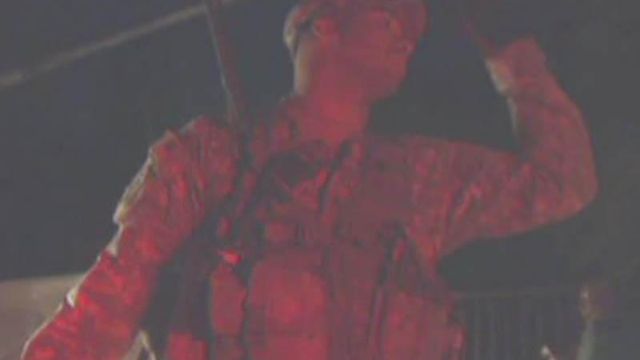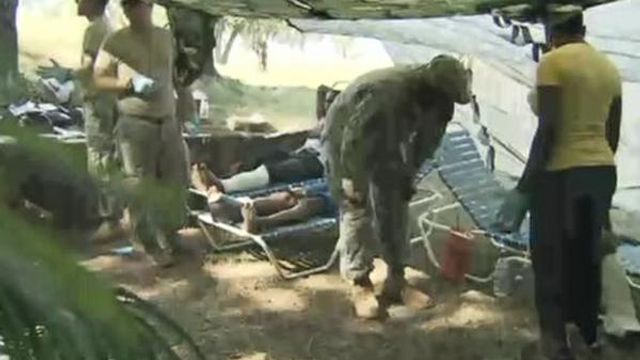More troops, aid go to Haiti, but hunger persists
Troops, doctors and aid workers flowed into Haiti on Monday even while victims of the quake that killed an estimated 200,000 people still struggled to find a cup of water or a handful of food.
Posted — UpdatedThousands of Camp Lejeune-based Marines were expected to arrive off the shore of Haiti's devastated capital city Monday, joining 1,000 82nd Airborne Division paratroopers already helping the relief effort on the island nation.
The 82nd Airborne is running one of four supply distribution points on a hillside overlooking Port-au-Prince. About 50,000 people have created what has come to be called a "survivor's camp" on that hillside in order to be close at hand for the daily distribution of food and water.
Nearby, the division's forward operating base is at Petionville Club, a damaged country club that is home to Haiti's only golf course. Army medics set up a triage center there, treating many injured children.
Paratroopers have also started going into hard-hit areas of the capital city and handing out rations to homeless residents, many of whom are camping out in the open streets because they fear aftershocks could topple any structure still standing in Port-au-Prince.
A convoy drove through neighborhoods in the pre-dawn hours Monday, tossing food and water to people walking along the streets in the dark. Whenever the convoy stopped, people crowded around to grab daily provisions.
"We like to keep guys in the back (of the truck) so that they don't just reach in here and grab a whole case (of water)," Sgt. Mike Billman said.
The desperation in the crowd was evident. One man tried to grab a box of food from the arms of a boy before Billman intervened.
"Don't take from the kid. Don't take from the kid," Billman ordered.
"It's so hard. You want to give everyone an individual meal," he said. "You want to hand it out everyone, but we're trying to get it to the pregnant women who can't make it up to where the distribution points are and the kids who can't make it up there."
Within a half-hour, the convoy had exhausted its supply of 10,000 bottles of water and 4,000 boxes of food.
"They had trouble getting food and water before, and it's just 10 times worse with the earthquake," Billman said.
The paratroopers will soon be joined by the 82nd Airborne's entire 2nd Brigade, bringing their numbers to 3,500.
At least three Haitian-Americans are among the troops assisting with the relief effort. Army Staff Sgt. Junior Florestal, for example, has been translating for officers.
The Camp Lejeune-based 2nd Marine Expeditionary Unit is expected to stay for at least 30 days. The outfit of 2,200 Marines and sailors will reinforce 1,000 Marines already on the ground.
The 2nd MEU is trained to provide disaster relief, including engineering support and medical aid. It is bringing trucks, earth-moving equipment and water-purification systems. The unit has been to Haiti at least three times before to provide relief to refugees and storm victims.
European nations on Monday pledged more than a half-billion dollars in emergency and long-term aid, on top of at least $100 million promised earlier by the U.S.
But help was still not reaching many victims of Tuesday's quake – choked back by transportation bottlenecks, bureaucratic confusion, fear of attacks on aid convoys, the collapse of local authority and the sheer scale of the need.
Looting spread to more parts of downtown Port-au-Prince as hundreds of young men and boys clambered up broken walls to break into shops and take whatever they can find. Especially prized was toothpaste, which people smear under their noses to fend off the stench of decaying bodies.
At a collapsed and burning shop in the market area, youths used broken bottles, machetes and razors to battle for bottles of rum and police fired shots to break up the crowd.
"I am drinking as much as I can. It gives courage," said Jean-Pierre Junior, wielding a broken wooden plank with nails to protect his bottle of rum.
Even so, the U.S. Army's on-the-ground commander, Lt. Gen. Ken Keen, said the city is seeing less violence than before the earthquake. "Is there gang violence? Yes. Was there gang violence before the earthquake? Absolutely."'
U.N. Secretary-General Ban Ki-moon announced Monday he wants 1,500 more U.N. police and 2,000 more troops to join the existing 7,000 military peacekeepers and 2,100 international police in Haiti.
While aid workers tried to make their way into Haiti, many people tried to leave. Hundreds of U.S. citizens, or people claiming to be, waved IDs as they formed a long line outside the U.S. Embassy in hopes of arranging a flight out of the country.
Roughly 200,000 people may have been killed in the magnitude-7.0 quake, the European Union said, quoting Haitian officials who also said about 70,000 bodies have been recovered so far.
EU officials estimated that about 250,000 were injured and 1.5 million were homeless.
Even many people whose houses survived are living outside for fear unstable buildings could collapse in aftershocks. And while more than 73,000 people have received a week's rations, according to U.N. officials, many more still wait.
So many people have lost homes that the World Food Program is planning a tent camp for 100,000 people – an instant city the size of Burbank, Calif. – on the outskirts of Port-au-Prince, according to the agency's country director, Myrta Kaulard.
Bodies still lay in the street six days after the quake, but Haitians had made progress in hauling many away for burial or burning. People were seen dragging corpses to intersections in hopes that garbage trucks or aid groups would arrive to take them away.
Six days after the quake, dozens of rescue crews were still working to rescue victims trapped under piles of concrete and debris.
"There are still people living" in collapsed buildings, U.N. humanitarian spokeswoman Elisabeth Byrs told The Associated Press. "Hope continues."
She said some might survive until Monday - and a few special cases could make it further: Rescuers pulled a 30-year-old man and a 40-year-old woman from a ruined supermarket on Sunday. Officials said they had had survived for so long by eating food where they were trapped.
Stunned by images of the disaster, the European Union Commission said it would contribute euro330 million ($474 million) in emergency and long-term aid to Haiti.
EU member states also poured euro92 million ($132 million) in emergency aid, including 20 million pounds ($32.7 million) from Britain and euro10 million ($14.4 million) from France, which also said it was willing for forgive Haiti's euro40 million ($55.7 million) debt.
"The impact of this earthquake is magnified because it has hit a country that was already desperately poor and historically volatile," said British Development Secretary Douglas Alexander.
U.S. officials, meanwhile, responded to criticism that they have given priority to military and rescue flights at the single-runway airport, which has room to park only a few planes at a time.
The U.N. World Food Program announced that American officials have agreed to a system giving humanitarian flights priority in landings.
French and Brazilian officials have complained that critical aid flights were not given permission to land and the Haiti operations manager for Doctors Without Borders, Benoit Leduc, said the diversion of three cargo planes to the neighboring Dominican Republic had slowed urgent medical aid.
"It's a fact. We are two days behind on the operations because of this access," he said. "Of course it's a small airport ... But it's clearly a matter of defining priorities."
With U.S. forces taking a major part in the relief effort, French Cooperation Minister Alain Joyandet said he wants the American role clarified.
"This is about helping Haiti, not about occupying Haiti," Joyandet said.
Foreign Minister Bernard Kouchner, however, urged governments not to squabble over the problem, telling France-Info radio that "people always want it to be their plane ... that lands."
Former President Bill Clinton and his daughter Chelsea shook hands with doctors and visited patients at the capital's General Hospital, crammed with about 1,500 patients. He promised that his foundation would provide medicine and a generator so that doctors there can work through the night.
Clinton is the U.N. special envoy for Haiti and he has joined former President George W. Bush in leading a campaign for donations to help the country.
• Credits
Copyright 2024 by WRAL.com and the Associated Press. All rights reserved. This material may not be published, broadcast, rewritten or redistributed.






